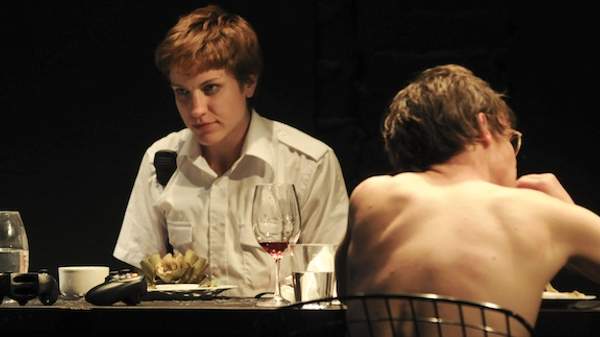Overview
Benedict Andrews is our current top gun in Australian theatre. Syncing with the German style of 'director's theatre', he's known for the kind of creatively adventurous, conceptually epic shows that open your eyes to new and powerful levels in a text you think you've known for years. A recent highlight was STC's Gross und Klein, where what from outside appeared like an impenetrable, anti-narrative bunker of a text became a beautifully surreal, emotionally tuned-in portrait of a thirty-something woman's alienation. His Marriage of Figaro awakened all the humour and colour lying in wait.
Given his highly imaginative style, we were all ready to believe he could write. And maybe he can there's just little evidence of it in his mainstage playwriting debut, Every Breath, which he also directs. It's a disappointing night of theatre that goes to show that the act of interpreting text is still a different one to writing it.
Every Breath is the story of a well-to-do family under threat and how each of them reacts to the presence of new security guard Chris (Shelly Lauman) on their property. How they mainly react, it transpires, is sexually. In turns, Leo (John Howard), Lydia (Angie Milliken) and their 16-year-old twins, Olivia (Eloise Mignon) and Oliver (Dylan Young), project their fantasies onto the ambiguously gendered Chris, and Chris acquiesces to every one.
It soon looks like a merry-go-round of sex and masturbation that occasionally pauses to let a metaphysical monologue on board. The confounding, disengaging effect happens because what intellectual and emotional hooks there are in the play are underdeveloped and not unleashed until its end. You don't feel for these characters at all because they seem unreal, and if that's because they are (it's suggested, at times), then that's a gyp. Understandably, the actors normally excellent seem ill at ease with what they're tasked with.
The production elements, one assumes, were built into the play at its creation, and they're oppressive. The austere, all-black set (Alice Babidge) has as its focal point a fake pool built into the centre of the stage. It's sometimes successful, in that it does create the slick illusion of water, but it also comes with a giant lid that moves heavily to create different angles for new scenes, looking for all the world like the yawning of pod bay doors on a perplexingly positioned spaceship. It also has the effect of pushing much of the action to the margins of the stage, which doesn't feel like a fair trade-off. The ominous sound design (Luke Smiles) is heavyhanded, though the lighting (Nick Schlieper) is quite brilliant, using a clever combination of strobe, deprivation and dark textures that at times give the perception that something monstrous is manifesting in the middle of the stage.
Within the polarising vein of British in-yer-face and German modernist theatre it's presumably speaking to, Every Breath ends up more pastiche than player, as it doesn't find those moments of sublime tragedy, euphoria or aliveness that elevate the standouts of that genre. Instead, we get moments like this: Oliver pushes a gun barrel into Chris's mouth. After a struggle, he withdraws it and slips in his furious tongue. The two lock in embrace before jumping apart and cowering in separate corners. The music swells until the bass is driving a jackhammer into your gut, telling you of all the intensity you're meant to be feeling. But you don't feel anything.
The text has fundamental flaws as well as some chinks in the filigree, but a dramaturg could have helped mend both. There are buds of good ideas of how we might imprint gender and sexuality onto others, for one they just haven't been thought out and turned over quite enough to become solid and effectual. Andrews has an incredible sense of the poetic in both language and aesthetics, but these moments are buried in limp, frequently cliched dialogues and monologues.
Every Breath should not have happened like this. Belvoir's normally rigorous dramaturgical processes seem to have slipped to give Andrews free reign. It's confounding given the common knowledge that even the best writer needs a good editor. Every director needs the sounding board of an assistant. But Andrews does not seem to have had anyone. In the program, the crew list is short; his director's note thanks not a soul.
Like the early works of many writers, Every Breath is preoccupied with the meaning and process of writing. Themes keep emerging of the writer as a creator, a manipulator, a god. The one without whom nothing would exist. But this is a troubling idea; it's not what a writer is, particularly in the theatre. A writer is a servant to their characters, their actors, their story, their ideas or their audience. It's something anyone sitting down to write could stand to remember.
Information
When
Saturday, March 24, 2012 - Sunday, April 29, 2012
Saturday, March 24 - Sunday, April 29, 2012
Where
Belvoir St Theatre Upstairs25 Belvoir Street
Surry Hills
